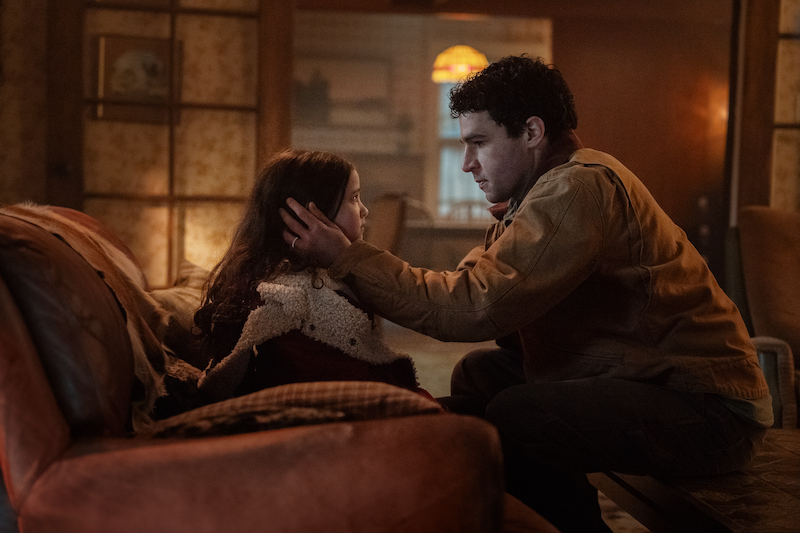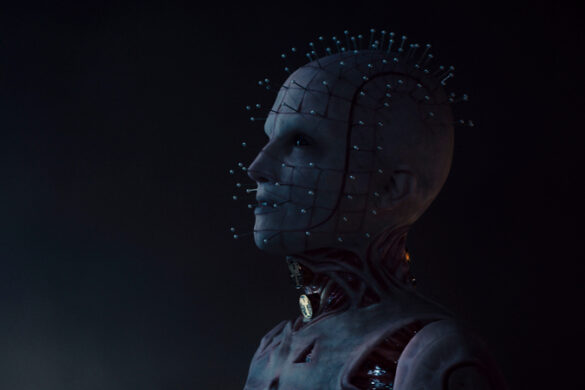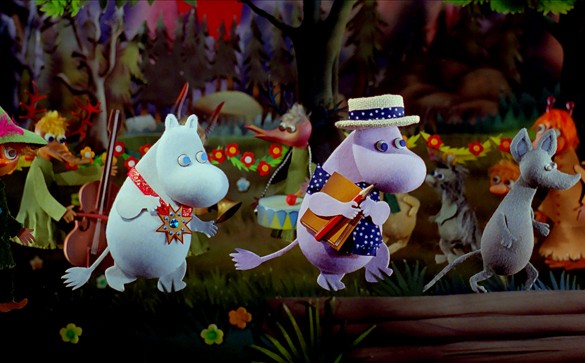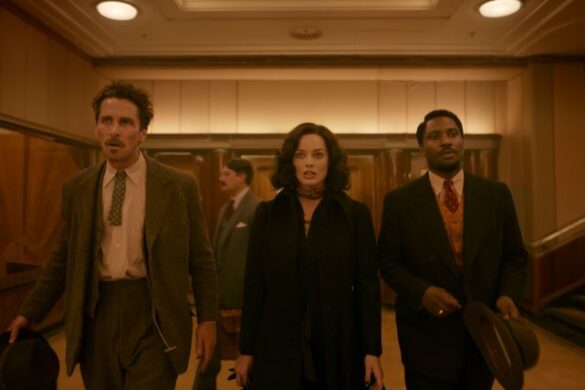“Wolf Man,” the monster movie from the early days of horror, is an undeniable classic that’s influenced other creature features. In the day and age of reboots and remakes, the Leigh Whannell-directed “Wolf Man” has the eponymous character howling once more—and it is a howl that is terrifyingly good.
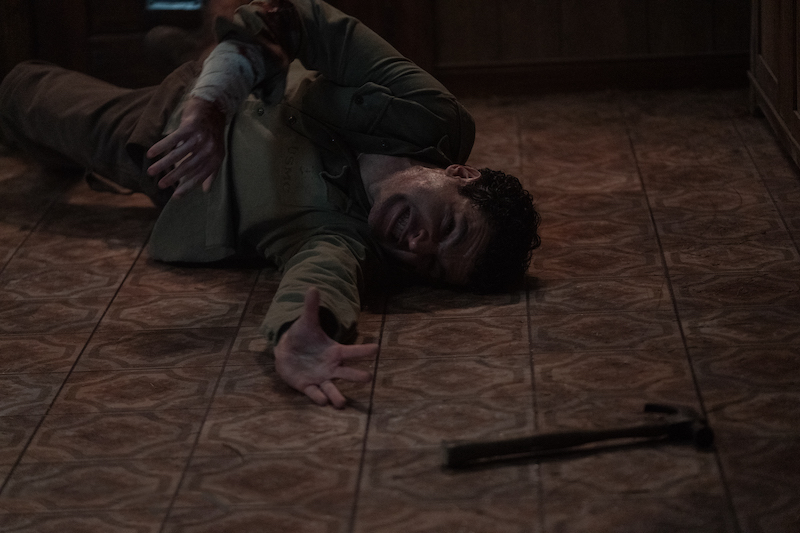
Christopher Abbott as Blake in Wolf Man, directed by Leigh Whannell
Like “Invisible Man” (2020), “Wolf Man” reimagines the classic Universal monster into a commentary on generational trauma and familial bonds. With its impeccable use of sound and lighting to create tension and fear, Whannell delivers terrifyingly isolated body horror that has something to say but doesn’t rely too heavily on gore or cheap scares.
The film opens with a young Blake (Zac Chandler) going out on a hunt with his father (Sam Jaeger) through a remote part of a forest. While Blake’s father teaches his son everything he needs to know about surviving out in the woods, including not touching poisonous mushrooms or getting lost in nature’s captivating beauty, his delivery could use some work. One could see the fear in Blake’s eyes, and his father scolded him for breaking away and going off on his own. All Blake wants to do is make his father proud, and he tries to do so when he believes he finds the deer they are hunting. However, a dirty hunting scope and uncertainty have the young boy questioning what he saw. And it isn’t until later that the unusual sounds that surround them both get louder and force them to take refuge in a hunting tower.
That same night, Blake overhears his father communicating on a CB radio, telling the receiver that he believes he’s found the elusive beast, whom many consider a myth.
30 years later, Blake (Christopher Abbott) has removed himself from his past and is now a writer between jobs. He’s a father to his daughter Ginger (Matilda Firth) and husband to the career-driven Charlotte (Julia Garner). The husband and wife fight over the usual things, but it is enough to question the strength of their relationship. Additionally, Charlotte feels Ginger is more connected with Blake, as noted by their introduction, in which he tells her his job is keeping her safe. Her job is to read his mind by gently touching his forehead with her palm and telling him that he is thinking, “I love you.”
Blake receives a notice that he’s inherited his remote childhood home in rural Oregon after his own father vanishes and is presumed dead. With their marriage on the brink of collapsing, Blake persuades Charlotte to take a break from the city and visit the property with their young daughter.
As they drive to Oregon, they are attacked by someone or something, which causes the moving truck they are in to roll over. As Blake tries to get his family’s safety, he is attacked by that same someone or something. So, in a desperate effort to protect themselves, they barricade themselves in Blake’s old home. However, as the night stretches on, Blake begins to behave strangely, transforming into something unrecognizable. Charlotte is forced to decide whether the terror within their house is more lethal than the danger without.
Perhaps what is striking about a film like “Wolf Man” is how it takes the mythology and modernizes it with its recontextualization and filming techniques. The film’s opening text provides the necessary exposition to help inform us about the legend of the “Wolf Man” within the story and how it has spanned generations. The film offers depictions of the duality of a parent protecting their child, with Blake’s father’s obsession blinding him from what a parent is supposed to do and Blake himself trying not to repeat the sins of the past.
Stefan Duscio’s cinematography creates a world that feels incredibly isolating and lonely as if there are worlds that separate you and the characters from any contact. The use of light and dark only helps to raise the tension and fear. One never really knows what’s around the corner or if they see what the characters see. The fear is there, though. Even in the safety of a home, there’s something so unnerving about being trapped with the man you love and the father of your child transforming into something hideous and unnatural.
As Charlotte, Garner convinces us that she is a mother and wife who provides and wants to be a part of the family but can’t because of her demanding job. She prioritizes work as she takes a call during a family dinner but is fully aware of how it affects her husband and daughter. This is a clever set-up to position her as the new protector as the film moves Abbott’s Blake to be the monster.
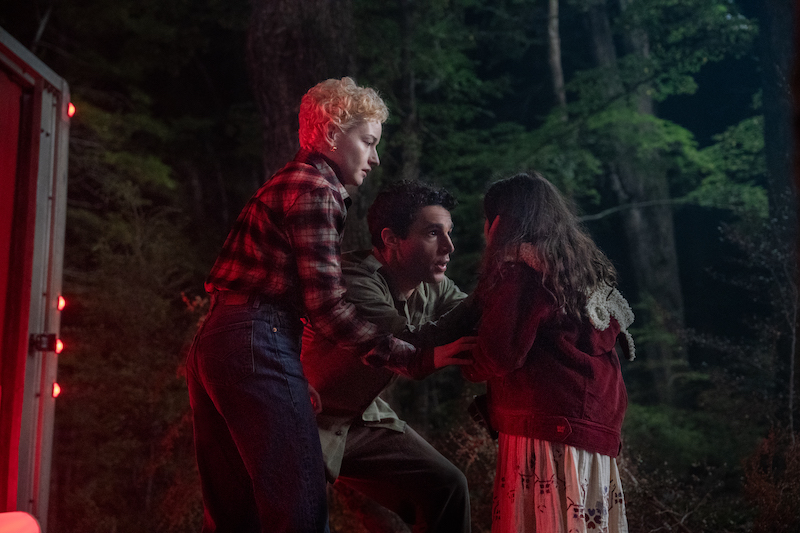
(from left) Charlotte (Julia Garner), Blake (Christopher Abbott) and Ginger (Matilda Firth) in Wolf Man, directed by Leigh Whannell.
The “Wolf Man” is not quite like its predecessors, although Whannell does his best to honor the character’s legacy. The creation of the titular beast goes in a completely different direction. It goes for something more practical, emphasizing the grotesqueness of two anatomies merging into one. So the transformation looks painful, and the final result looks monstrous. Abbott’s performance sells both aspects, as he loses himself in the character. His teeth are popping out of his mouth, and his fingernails are coming off as his claws grow out. Soon, he loses his ability to write words about his feelings. All of this leads to the inevitable.
What’s more, not only does “Wolf Man” put a modern-day spin on the classic monster, but the theme of a broken family trying to repair itself is viewed through the lens of dueling character perspectives. It’s actually quite ingenious to see how Whannell uses the transformation to provide audiences with a sense of what Blake is experiencing as he slowly becomes the Wolf Man. Here, his senses are heightened. Blake’s point of view is a collection of distorted sounds and gleaming lights. He can smell things that Charlotte can’t. However, as he slowly becomes the Wolf Man, he also loses his capacity to understand speech. The family he once knew becomes monsters themselves as their eyes give off a scary glow, and their speech sounds terrifying.
On the flip side of it, Charlotte and Ginger bear witness to a loved one getting sicker and sicker and are powerless to do anything about it. As such, they only have each other to rely on from here on out. There’s no magic bullet. No spell incantations to reverse the process. All Charlotte can do is assume the role of protector to a daughter growing distant from her.
Taking on these dueling perspectives couldn’t have been easy, but it comes off effortlessly, thanks in no small part to Garner and Abbott’s performances, along with the scene-stealing Firth. The fear they all experience is purely reactive and genuine, as they are all powerless to do anything about the changes that come with infection.
There are a few eye-roll moments though that comes in the form of plot twists. After spending so much time with Blake, Charolette and Ginger, the twist doesn’t undo the film but it just feels like something that was thrown in there for the sake of trying to shock the audience. That said, the efficacy of this particular plot twist may vary.
“Wolf Man” never loses its focus, and that’s what makes it shine so brightly. The pacing is very smooth. It also helps that we don’t have to track too many characters. Our concentration should be on a mother and daughter trying to survive the night with their very sick husband and father. There’s no doubt what the film is about or what it’s trying to convey within the genre it’s in. It’s also a visceral horror, making it all the more reason to see it in a theater.
9/10

